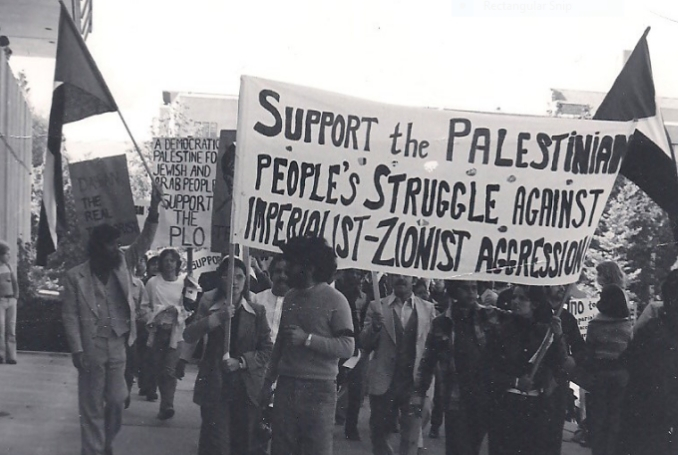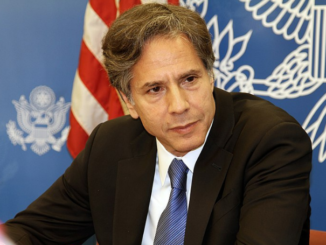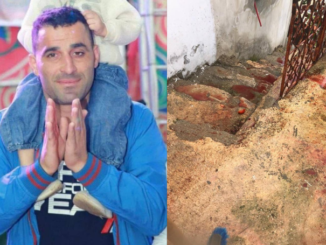
By Jamal Kanj
Seventy-five years following the Nakba, I stand as the son of two “invisible” Palestinian parents who were “spirited” from their homes to make “room” for European Khazar converts.
Israel is most probably the only “nation” in the post-colonial era, where claiming sovereignty over a territory was determined by a foreign-born minority population. Under the tutelage of British colonists, Zionist paramilitary groups waged a terror campaign and ethnically cleansed more than 800,000 Palestinians (according to UN data) from their homes, seized their land, and razed from existence over 500 towns and villages.
For more than half a century before 1948, political Zionism constructed distorted narratives by weaving together myths, legends, and fables to craft a specious history atop the ruins of Palestinian homes. The Zionist project usurped the age-old natives’ cultural identity, employed its hasbara to fabricate false geography, and truncated mythological history.
The success of this deception would not have been possible without the full complicity of Western powers and the Church―each serving its own unscrupulous agenda―embracing alternative Zionist facts to justify the dispossession of the people of Palestine.
Take for example the recent congratulatory message from European Commission President Ursula von der Leyen on the 75th anniversary of the Zionist project. In her video missive, she parroted a falsehood propagated by Zionists, and that they “made the desert bloom.”
Imagine if someone assumes credit for making a desert bloom in Sweden. It would be absurd, wouldn’t it?
So why is it not equally preposterous when Zionists, or their pawns in the West, make the same about a country located in the heart of the Fertile Crescent, and with an annual rainfall comparable to that of Sweden? In fact, the average rainfall in Jerusalem, and the Galilee regions of historical Palestine exceeds that of the Stockholm “desert!”
These meteorological conditions are not recent phenomena, but already inferred in the Old Testament, Exodus 3:17 when describing the land of the Canaanites (the original Palestinians) as “a land flowing with milk and honey.”
If we assume von der Leyen may have been unaware of the Jewish Bible, or uninformed of Palestine’s climate characteristics, it is highly unlikely that Zionists would have been unfamiliar with the supposed promises laid out in the Old Testament. Yet, the dissemination of Zionist myths remains unchallenged by Western intellectuals, allowing it to permeate history books with fairytales, thus, fostering ignorance at the highest levels.
Western intellectuals disregarded Palestinian and Jewish scholars who debunked the fallacy of the Zionist narratives. For instance, Ahad Ha’Am, the prominent East European Jewish thinker and father of Cultural Zionism visited Palestine in 1891, long before Theodor Herzl, founder of political Zionism, set foot in the Holy Land. Ha’Am was among the early Jews who questioned political Zionism’s tales concerning Palestine.
Upon his arrival, he wrote back to his followers in Europe on his observations during his trip saying, “We abroad are used to believe the Eretz Yisrael (Palestine) is now almost totally desolate, a desert that is not sowed … But in truth that is not the case. Throughout the country, it is difficult to find fields that are not sowed.”
The Zionist movement that willed to contradict the Old Testament regarding the land of “milk and honey,” perpetuated yet another unchallenged ludicrous myth calling Palestine “a land without people for a people without land.” The slogan was repeated by Israeli leader Golda Meir when she told the Sunday Times in 1969, “There was no such thing as Palestinians.” Current Israeli Finance Minister Bezalel Smotrich, a Jewish supremacist, echoed, almost verbatim, Meir’s statement during his visit to Paris last March,
To refute this malarkey, and since Zionists have already distorted their own biblical narratives, I will refrain from quoting the Old Testament regarding the people in the Land of Canaan. Neither would I point to the nine crusade campaigns that were seemingly defeated by “non-existing” inhabitants; nor will I cite British colonists’ census in Palestine. Further, I shall not argue the obvious: I write, I therefore exist. I’ll, however, rely on two major Zionist sources, predating the establishment of Israel.
In his diary entry from 1895, Herzl, founder of political Zionism wrote, “We shall try to spirit the penniless population across the border . . . the process of expropriation and the removal . . . must be carried out discreetly and circumspectly.”
Likewise, in the mid-1940s, Joseph Weitz, the director of the Jewish National Fund (JNF) explained, “It must be clear that there is no room in the country for both peoples.”
Seventy-five years following the Nakba, I stand as the son of two “invisible” Palestinian parents who were “spirited” from their homes to make “room” for European Khazar converts. “The penniless” refugees may no longer live in Palestine, but to the chagrin of Zionism, the land of “milk and honey” continues to live in them.

– Jamal Kanj is the author of “Children of Catastrophe,” Journey from a Palestinian Refugee Camp to America, and other books. He writes frequently on Arab world issues for various national and international commentaries. He contributed this article to The Palestine Chronicle







